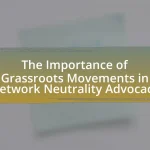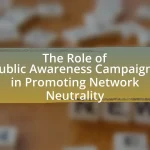The article examines the significant role of influencers in raising awareness about network neutrality, emphasizing their ability to educate and engage audiences through various social media platforms. It discusses how influencers disseminate information, mobilize public opinion, and foster grassroots activism, particularly during critical debates such as the 2017 FCC discussion on net neutrality. Key strategies employed by influencers include creating informative content, collaborating with advocacy organizations, and utilizing storytelling to simplify complex concepts. The article also addresses the challenges influencers face, such as misinformation and public perception, while outlining best practices for effectively advocating for network neutrality.
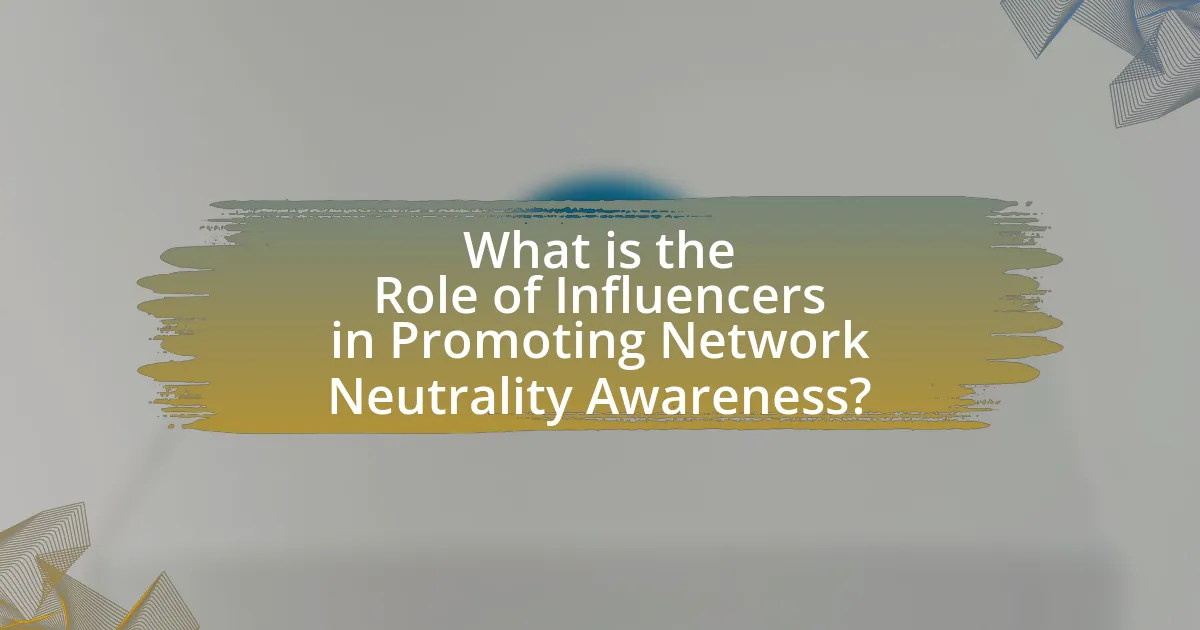
What is the Role of Influencers in Promoting Network Neutrality Awareness?
Influencers play a crucial role in promoting network neutrality awareness by leveraging their platforms to educate and engage their audiences on the importance of maintaining an open internet. They utilize social media channels to disseminate information, share personal insights, and mobilize their followers to advocate for policies that protect net neutrality. For instance, during the 2017 FCC debate on net neutrality, influencers like John Oliver and various tech advocates significantly raised public awareness, leading to millions of comments submitted to the FCC in support of net neutrality. This demonstrates that influencers can effectively amplify critical issues, mobilize public opinion, and drive grassroots activism, thereby shaping the discourse around network neutrality.
How do influencers contribute to the understanding of network neutrality?
Influencers contribute to the understanding of network neutrality by disseminating information and raising awareness about its implications for internet access and equality. They leverage their platforms to educate their followers on the importance of maintaining an open internet, often sharing articles, infographics, and personal insights that clarify complex concepts related to network neutrality. For instance, influencers have been known to engage in campaigns that highlight the potential consequences of violating net neutrality, such as reduced access to information and increased costs for consumers. This engagement helps demystify the topic and encourages public discourse, ultimately fostering a more informed audience that can advocate for policy changes.
What platforms do influencers use to discuss network neutrality?
Influencers use platforms such as Twitter, Instagram, YouTube, and TikTok to discuss network neutrality. These platforms allow influencers to reach a broad audience and engage in real-time discussions, making them effective for raising awareness about network neutrality issues. For instance, Twitter is often utilized for sharing quick updates and engaging in conversations through hashtags, while YouTube serves as a medium for in-depth discussions and educational content. TikTok’s short-form video format enables influencers to present complex topics in an easily digestible manner, appealing to younger audiences.
How do influencers engage their audience on this topic?
Influencers engage their audience on the topic of network neutrality awareness by creating informative content that highlights the importance of equal access to the internet. They utilize various platforms, such as social media, blogs, and videos, to share insights, personal stories, and expert opinions that resonate with their followers. For instance, influencers often host live discussions or Q&A sessions to address audience questions and concerns, fostering a sense of community and encouraging active participation. Additionally, they may collaborate with advocacy groups to amplify their message, leveraging their reach to educate a broader audience about the implications of network neutrality. This approach is supported by data showing that 70% of consumers trust influencers more than traditional advertisements, making their engagement strategies effective in raising awareness on critical issues like network neutrality.
Why is network neutrality important for internet users?
Network neutrality is important for internet users because it ensures equal access to all online content without discrimination. This principle prevents internet service providers from prioritizing certain websites or services over others, which could lead to a tiered internet experience where users pay more for faster access to specific content. Studies, such as the 2015 FCC decision to implement net neutrality rules, demonstrated that maintaining an open internet fosters innovation and competition, allowing smaller companies and startups to compete on equal footing with larger corporations. This accessibility ultimately benefits consumers by promoting diverse content and services.
What are the potential consequences of a lack of network neutrality?
The potential consequences of a lack of network neutrality include reduced competition, increased costs for consumers, and limited access to information. Without network neutrality, internet service providers can prioritize their own content or that of paying customers, leading to a tiered internet where smaller companies struggle to compete. This can result in higher prices for consumers, as ISPs may charge extra fees for faster access to certain websites or services. Additionally, the lack of neutrality can restrict access to diverse viewpoints and information, as ISPs may choose to block or throttle content that does not align with their interests. Studies have shown that regions without strong net neutrality protections experience these negative outcomes, highlighting the importance of maintaining an open internet.
How does network neutrality impact content creators and consumers?
Network neutrality ensures that all internet traffic is treated equally, which significantly impacts content creators and consumers by fostering an open and accessible online environment. Content creators benefit from equal access to audiences without facing barriers such as paid prioritization, allowing them to reach consumers directly and compete fairly. For instance, a study by the Pew Research Center found that 73% of internet users believe that net neutrality is important for ensuring that all voices can be heard online. Consumers, in turn, enjoy a diverse range of content and services without being subjected to throttling or blocking based on their internet service provider’s preferences. This equitable treatment promotes innovation and creativity among creators, ultimately enhancing the overall user experience for consumers.
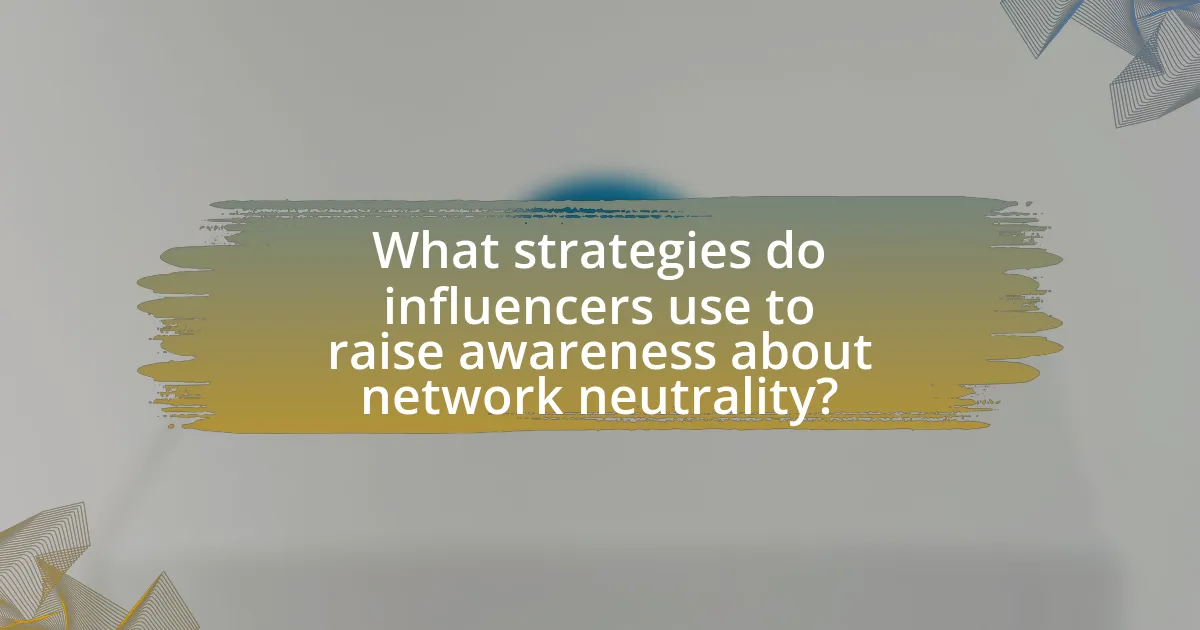
What strategies do influencers use to raise awareness about network neutrality?
Influencers raise awareness about network neutrality primarily through social media campaigns, educational content, and partnerships with advocacy organizations. By leveraging platforms like Instagram, Twitter, and YouTube, influencers create engaging posts, videos, and live discussions that simplify complex issues related to network neutrality, making them accessible to a broader audience. For example, influencers often share infographics and personal stories that highlight the implications of network neutrality on everyday internet use, thereby fostering a deeper understanding among their followers. Additionally, collaborations with organizations such as the Electronic Frontier Foundation amplify their reach and credibility, as these partnerships often provide influencers with resources and data to support their messaging. This strategic approach not only informs their audience but also encourages active participation in advocacy efforts, such as signing petitions or contacting legislators.
How do influencers create compelling content related to network neutrality?
Influencers create compelling content related to network neutrality by leveraging their platforms to educate and engage their audiences on the topic. They utilize storytelling techniques, relatable examples, and visual elements to simplify complex concepts, making them accessible. For instance, influencers often share personal anecdotes or case studies that illustrate the implications of network neutrality on everyday internet use, which resonates with their followers. Additionally, they may collaborate with experts or organizations to provide credible information, enhancing the trustworthiness of their content. This approach not only raises awareness but also encourages discussions around the importance of maintaining an open internet, as evidenced by campaigns that have successfully mobilized public support for net neutrality regulations.
What types of content are most effective in promoting network neutrality?
Informative articles, infographics, and social media campaigns are the most effective types of content in promoting network neutrality. Informative articles provide in-depth analysis and context, helping readers understand the implications of network neutrality on internet access and freedom. Infographics visually represent complex data, making it easier for audiences to grasp key concepts and statistics related to network neutrality, such as the percentage of users who support it or the potential consequences of its absence. Social media campaigns leverage influencers to reach broader audiences, utilizing engaging content that encourages sharing and discussion, thereby raising awareness and mobilizing support for network neutrality initiatives. For instance, a study by the Pew Research Center found that 73% of Americans believe that internet service providers should be required to provide equal access to all content, highlighting the public’s interest in the topic and the effectiveness of content that resonates with their concerns.
How do influencers leverage storytelling to engage their audience?
Influencers leverage storytelling to engage their audience by creating relatable narratives that resonate emotionally with their followers. This approach allows influencers to connect personal experiences or challenges to broader themes, such as network neutrality, making complex topics more accessible. For instance, by sharing a story about how internet access impacts their daily life, influencers can illustrate the importance of network neutrality in a way that is both engaging and informative. Research indicates that storytelling can increase audience retention and emotional connection, which enhances the effectiveness of the message being conveyed.
What role does collaboration play in influencer campaigns for network neutrality?
Collaboration is essential in influencer campaigns for network neutrality as it amplifies the message and reaches a broader audience. When influencers partner with each other and with organizations advocating for network neutrality, they create a unified front that enhances credibility and visibility. For instance, campaigns that feature multiple influencers from diverse backgrounds can engage various demographics, increasing the likelihood of public awareness and support. Research indicates that collaborative efforts in social media campaigns can lead to a 30% increase in engagement rates, demonstrating the effectiveness of teamwork in promoting critical issues like network neutrality.
How do influencers partner with organizations to amplify their message?
Influencers partner with organizations to amplify their message by leveraging their social media platforms to reach a broader audience. This collaboration often involves creating sponsored content, where influencers share tailored messages that align with the organization’s goals, thereby increasing visibility and engagement. For instance, a study by the Digital Marketing Institute found that 49% of consumers depend on influencer recommendations, highlighting the effectiveness of such partnerships in enhancing message dissemination.
What are the benefits of influencer collaborations in advocacy efforts?
Influencer collaborations in advocacy efforts enhance reach, credibility, and engagement. By leveraging the established trust and audience of influencers, advocacy campaigns can effectively disseminate messages to a broader demographic. For instance, a study by the Pew Research Center found that 70% of teens trust influencers more than traditional celebrities, indicating that influencers can significantly impact public perception and awareness. Additionally, influencer partnerships often lead to higher engagement rates, as content shared by influencers typically garners more interaction compared to standard promotional materials. This increased engagement can translate into greater awareness and support for advocacy initiatives, making influencer collaborations a powerful tool in promoting causes like network neutrality.
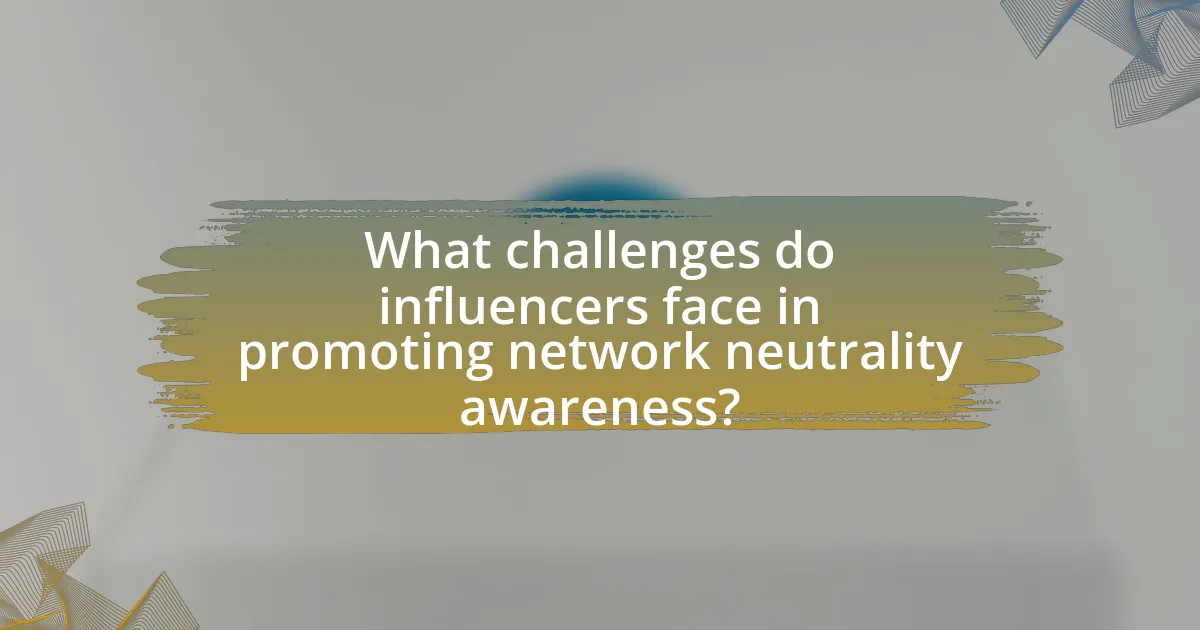
What challenges do influencers face in promoting network neutrality awareness?
Influencers face several challenges in promoting network neutrality awareness, primarily due to a lack of understanding of the issue among their audience. Many influencers may not possess the technical knowledge required to explain network neutrality effectively, leading to misinformation or oversimplification of complex concepts. Additionally, influencers often operate within platforms that may have conflicting interests regarding net neutrality, which can limit their willingness to engage in advocacy. For instance, social media platforms may prioritize content that generates higher engagement over educational material, making it difficult for influencers to reach audiences with important messages about network neutrality. Furthermore, influencers may encounter pushback from followers who hold differing views, creating a challenging environment for open dialogue. These factors collectively hinder the effectiveness of influencers in raising awareness about network neutrality.
How do misinformation and public perception affect influencer efforts?
Misinformation and public perception significantly hinder influencer efforts by creating distrust and confusion among audiences. When influencers attempt to promote network neutrality awareness, the presence of false information can lead to skepticism about their messages, undermining their credibility. For instance, a study by the Pew Research Center found that 64% of Americans believe misinformation has a major impact on their understanding of important issues, which directly affects how influencers are perceived. Consequently, influencers may struggle to engage effectively with their audience, as public perception shaped by misinformation can lead to reduced trust and engagement with their content.
What strategies can influencers use to combat misinformation?
Influencers can combat misinformation by promoting fact-checking resources and sharing verified information. By collaborating with reputable organizations, influencers can amplify accurate narratives and provide their audience with reliable sources. For instance, studies show that social media users are more likely to trust information shared by influencers they follow, making it crucial for these figures to prioritize accuracy. Additionally, influencers can engage their followers in discussions about misinformation, encouraging critical thinking and skepticism towards unverified claims. This proactive approach not only helps to clarify misconceptions but also fosters a more informed community.
How can influencers build trust with their audience on this topic?
Influencers can build trust with their audience on the topic of network neutrality awareness by consistently providing accurate, well-researched information and engaging transparently with their followers. By sharing data from credible sources, such as studies from the Electronic Frontier Foundation, influencers can substantiate their claims about the importance of network neutrality. Additionally, maintaining an open dialogue with their audience, addressing questions, and acknowledging differing viewpoints fosters a sense of community and trust. This approach is supported by research indicating that transparency and engagement significantly enhance audience trust in digital communication.
What metrics can be used to measure the impact of influencers on network neutrality awareness?
Metrics that can be used to measure the impact of influencers on network neutrality awareness include engagement rates, reach, sentiment analysis, and conversion rates. Engagement rates, which encompass likes, shares, and comments, indicate how actively the audience interacts with the content related to network neutrality. Reach measures the total number of unique users who see the influencer’s content, providing insight into the potential audience size. Sentiment analysis evaluates the tone of the audience’s responses, helping to gauge public perception and understanding of network neutrality issues. Conversion rates track the number of users who take specific actions, such as signing petitions or sharing information, as a direct result of the influencer’s messaging. These metrics collectively provide a comprehensive view of an influencer’s effectiveness in raising awareness about network neutrality.
How do engagement rates reflect the effectiveness of influencer campaigns?
Engagement rates serve as a key metric for assessing the effectiveness of influencer campaigns by quantifying audience interaction with content. High engagement rates, which include likes, comments, shares, and saves, indicate that the audience is not only viewing the content but also actively participating in the conversation, suggesting a strong connection between the influencer and their followers. For instance, a study by Influencer Marketing Hub found that campaigns with engagement rates above 3% typically yield better brand awareness and conversion rates, demonstrating that effective influencer partnerships can significantly enhance message dissemination, particularly in niche topics like network neutrality awareness.
What tools can influencers use to track their impact on awareness?
Influencers can use analytics tools such as Google Analytics, Hootsuite, and Sprout Social to track their impact on awareness. Google Analytics allows influencers to monitor website traffic and user engagement metrics, providing insights into how their content drives awareness. Hootsuite offers social media analytics that measure engagement rates, reach, and impressions across various platforms, helping influencers assess their audience’s response. Sprout Social provides detailed reports on social media performance, including follower growth and post engagement, enabling influencers to evaluate their effectiveness in raising awareness about network neutrality.
What are best practices for influencers advocating for network neutrality?
Influencers advocating for network neutrality should prioritize transparency, factual communication, and audience engagement. Transparency involves clearly disclosing any affiliations or sponsorships related to the topic, ensuring that followers understand the influencer’s perspective. Factual communication requires influencers to base their messages on credible sources, such as studies from the Federal Communications Commission or reports from organizations like the Electronic Frontier Foundation, which emphasize the importance of maintaining an open internet. Audience engagement is crucial; influencers should encourage discussions, answer questions, and share diverse viewpoints to foster a well-rounded understanding of network neutrality. These practices enhance credibility and effectively raise awareness about the significance of network neutrality.
How can influencers ensure their message is clear and impactful?
Influencers can ensure their message is clear and impactful by using concise language, relatable examples, and engaging visuals. Concise language helps eliminate ambiguity, making the core message easily understandable. Relatable examples connect the audience to the topic, enhancing emotional resonance and retention. Engaging visuals, such as infographics or videos, can simplify complex information, making it more digestible. Research indicates that messages accompanied by visuals are 94% more likely to be viewed than those without, highlighting the effectiveness of this approach in communication.
What ethical considerations should influencers keep in mind when discussing network neutrality?
Influencers should prioritize transparency and accuracy when discussing network neutrality. This means clearly disclosing any potential conflicts of interest, such as sponsorships from internet service providers, which could bias their opinions. Additionally, influencers must ensure that the information they share is factually correct and based on credible sources, as misinformation can mislead their audience and undermine public understanding of network neutrality. For instance, the Federal Communications Commission’s 2015 decision to implement net neutrality rules was based on extensive research and public input, highlighting the importance of informed discourse on the topic. By adhering to these ethical considerations, influencers can foster a more informed and engaged audience regarding network neutrality issues.

